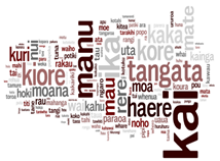A collaborative project, managed by Dr Hēmi Whaanga, University of Waikato.
Collaborator: Dr Cilla Wehi
Summary
This project aims to uncover past relationships that Māori have with the environment through an interdisciplinary study of whakataukī (Māori ancestral sayings).
Project Overview
 New Zealand was one of the last land masses settled by humans, with the arrival of Māori ca. 1300 AD. Rapid cultural and ecological change occurred after settlement, with population expansion, the extinction of important elements of the biota (e.g. moa), and societal and habitat fragmentation after later European contact. This relatively recent human history allows an unprecedented opportunity to investigate how conservation principles and practices developed in Māori society in response to changing environmental and societal contexts.
New Zealand was one of the last land masses settled by humans, with the arrival of Māori ca. 1300 AD. Rapid cultural and ecological change occurred after settlement, with population expansion, the extinction of important elements of the biota (e.g. moa), and societal and habitat fragmentation after later European contact. This relatively recent human history allows an unprecedented opportunity to investigate how conservation principles and practices developed in Māori society in response to changing environmental and societal contexts.
This research explores socio-ecological relationships that are embedded in Māori ancestral sayings. Pre European contact Māori culture had a strongly developed tradition of oral literature, and ancestral sayings (whakataukī) enjoyed wide currency. Whakataukī represented one of the main ways of transmitting critical information about all aspects of life and society, including TEK. In this research, we use linguistic markers and changes through time to tease out developments in TEK and conservation thought.
In doing so, we will investigate the contribution that whakataukī can make to contemporary issues associated with language and cultural sustainability, biodiversity and conservation. We aim to collect and preserve a significant body of cultural and biological knowledge that might otherwise be lost, benefiting Māori language and culture, linguistics and conservation in New Zealand.
Research Updates
The project officially began in March 2013.
Project Publications
Conference Presentations:
Wehi P.M., Whaanga H., Cox M. & Roa T. 2013. Patterns of ecological thought determined from linguistic analysis of oral tradition. Invited keynote speaker. Symposium: Island biocultural diversity and traditional ecological knowledge. Joint British Ecological Society Conference and 11th INTECOL Congress: Into the Next 100 Years. 18-23 August, London, UK.
Whaanga H, Wehi PM, Roa T, Cox M. 2013. Whakataukī as a blueprint for living. He Manawa Whenua Conference, 1-3 July, Hamilton, NZ.
Media
Roa, T. (15/11/2012). Interview on 'Māori whakataukī and conservation.' on Radio Wātea with Julian Wilcox.
Whaanga, H. (6/11/2012). Interview on 'He rongo i te reo rauriki, i te reo reiuru: Whakataukī and conservation of biodiversity in Aotearoa.' on Mataora (Te Reo Channel) with Eruera Morgan.
Whaanga, H. (14/11/2012). Interview on 'He rongo i te reo rauriki, i te reo reiuru: Whakataukī and conservation of biodiversity in Aotearoa.' on Radio Wātea with Dale Husband.
Whaanga, H. (14/11/2012). Interview on 'He rongo i te reo rauriki, i te reo reiuru: Whakataukī and conservation of biodiversity in Aotearoa.' on Radio Wātea with Miriama Wilson.
Whaanga, H. & Wehi, P. (26/11/2012). Magazine article 'Wisdom of elders used to manage environments'. Elements Magazine. Available online at: http://www.elementmagazine.co.nz/world/global-news/wisdom-of-elders-used-to-manage-environments
More on this project
For more information visit our website: www.heherengakorero.co.nz
Funder: Marsden (via sub-contract from Waikato University)
Term: March 2013 - February 2016
